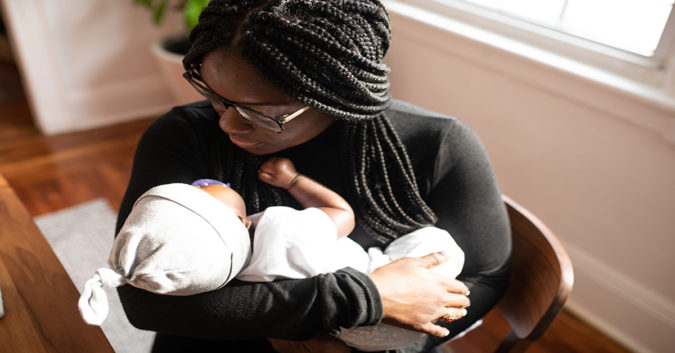As part of this April’s National Minority Health Month, the Black Mamas Matter Alliance has announced its fourth annual Black Maternal Health Week (BMHW), which runs from April 11 through April 17.
Intended to be a weeklong period of awareness, education, activism, and community-building, Black Maternal Health Week aims to:
- Draw awareness to issues regarding black maternal health
- Promote community-driven policy, research, and care solutions for black mothers
- Focus attention on the individual voices of black mothers, families, and communities
- Create a national platform for black-led entities and efforts on maternal health, birth, and reproductive justice
According to the Black Mamas Matters Alliance:
“We envision a world where black mamas have the rights, respect, and resources to thrive before, during, and after pregnancy.”
Black Maternal Health Week is part of a larger overall push to more evenly distribute health equity across all racial and ethnic groups — a major issue that rarely gets the attention and resources it deserves.
What Issues Affect Black Mothers?
In short, there is a tremendous disparity between black and white mothers when it comes to overall reproductive health. This disparity largely stems from an overall lack of resources in predominantly black communities.
According to the U.S. Centers for Disease Control and Prevention (CDC), black mothers are more than 3 times as likely to die during pregnancy or from birth-related injuries than that of white mothers.
On average, for every 100,000 births by white women, there are 13.4 deaths. Conversely, for every 100,000 births by black women, there are 41.7 deaths.
This disparity reflects a systemic issue. As Fleda Jackson, PhD, notes in the documentary "The Naked Truth: Death by Delivery:"
“Black women are treated differently because of the color of their skin….Many don’t know their rights and suffer abuses, and they don’t have insurance. And they also suffer from sexism. They are Black and they are women. There is no rest for them in these circumstances.”
In addition, black women living in poorly funded urban communities lack access to healthy food and safe drinking water, and suffer from unsafe living conditions with high crime rates. Such areas bear long histories of limited access to quality education and well-paying jobs. In general, historical segregation has led to poorer hospitals with substandard care and higher rates of life-threatening complications.
Given the living conditions in some urban areas, black women are also more likely to be uninsured or under-insured while at the same time suffering from chronic health conditions such as obesity, diabetes, and hypertension — all of which dramatically increase the risk of health complications during pregnancy and birth.
Birth Injuries Are More Common Among Black Mothers
Birth injuries are classified as any form of harm that comes to an infant as they are born. These types of injuries can damage a baby’s brain and/or body.
One of the most common types of birth injuries, cerebral palsy, has been found to occur at a higher frequency among black newborns than newborns of other races.
According to a 2012 study that investigated rates of cerebral palsy among black and white newborns:
“Black children in the United States appear to have a higher prevalence of cerebral palsy overall than white children.”
The study shows that for every 1,000 black newborns, roughly 4 are diagnosed with cerebral palsy. According to the authors of the study, the disparity between black and white babies may be due to race-based risk factors, access to interventions, and under-identification of cerebral palsy due to substandard care.
Do Your Part: Support Black Mothers Today and Every Day
While the Black Lives Matter movement remains at the forefront of the national conversation, there has never been a better time to get involved in creating and promoting equity across our communities and our country.
To be a part of the movement and support black mothers, consider doing the following:
- Educate yourself on the broader issues affecting black mothers
- Share educational materials with your own local and online communities to spread awareness
- Get involved with local, community-based efforts that support black mothers
- Fundraise on behalf of organizations like the Black Mamas Matter Alliance
- Donate your time, money, and energy to nonprofit organizations that focus on black mothers and health-related issues
To show your support for black mothers, consider donating to the Black Mamas Matter Alliance.
Only by working together can our country begin to heal the equality and equity issues that have plagued minority communities for generations. Now is the time for everyone to step up and do their part.
